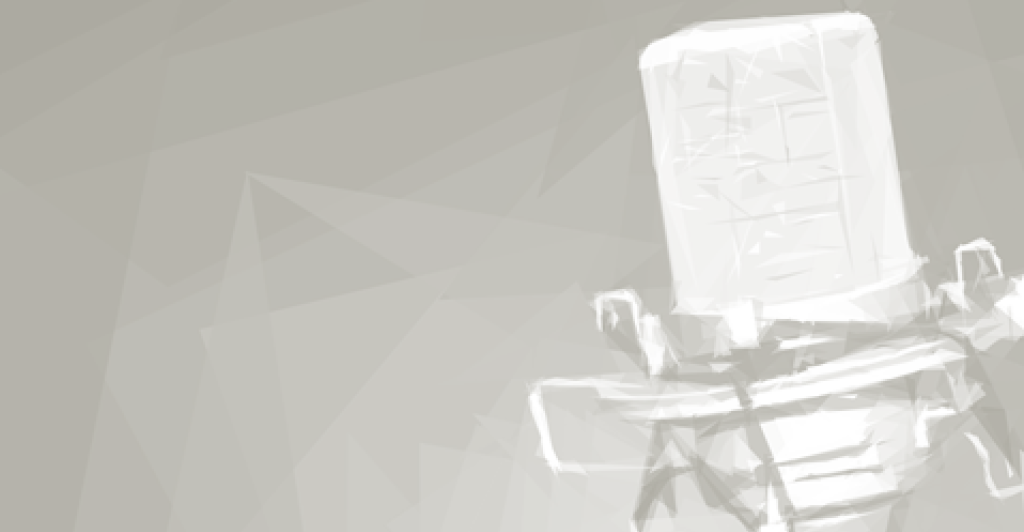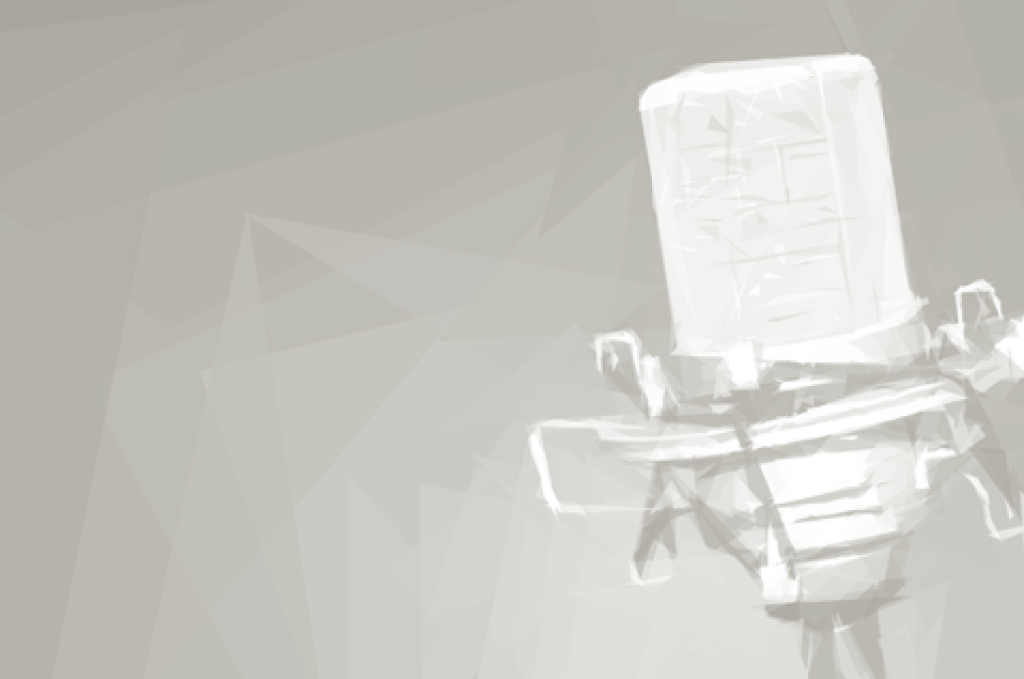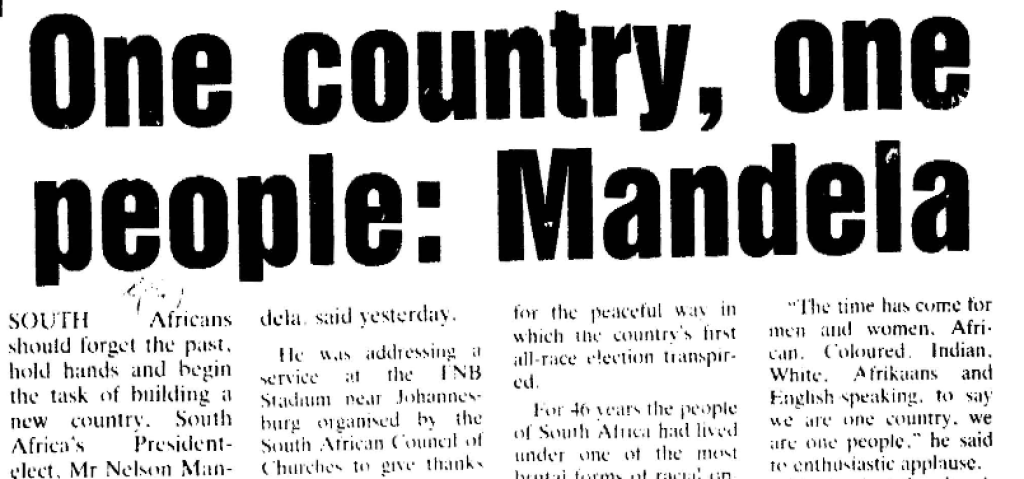Days before the official count of votes was complete, the outcome was clear and the ANC celebrated victory. Mandela’s brief speech spelt out his mission and mandate as the president in the country’s first democratically elected government.
On ‘one of the most important moments in the life of our country’, he congratulated people in the ANC and the democratic movement for their hard work in the last few days and over the years; and the people of South Africa as a whole. There were congratulations for De Klerk – who had conceded defeat in a television address earlier that evening; for General Viljoen; and for the leader of the Democratic Party, all of whom had pledged their support and cooperation and whom he looked forward to working with. The security forces were commended for their role in ensuring a peaceful election, ‘laying a solid foundation for a truly professional security force committed to service to the people and loyalty to the new constitution.’
And he called on all South Africans to work to build the future together as mandated by the electorate.
Tomorrow, the entire ANC leadership and I will be back at our desks. We are rolling up our sleeves to begin tackling the problems our country faces. We ask you all to join us - go back to your jobs in the morning. Let's get South Africa working.
For we must, together and without delay, begin to build a better life for all South Africans. This means creating jobs, building houses, providing education and bringing peace and security for all.
This is going to be the acid test of the Government of National Unity. We have emerged as the majority party on the basis of the programme which is contained in the Reconstruction and Development Programme. There we have outlined the steps that we are going to take in order to ensure a better life for all South Africans.
Almost all the organizations that are going to take part in the Government of National Unity have undertaken in the course of the campaign to contribute to the better life of our people. That is going to be the cornerstone, the foundation on which the Government of National Unity is going to be based.
And I appeal to all the leaders who are going to serve in this government, to honour that programme. And to go there determined to contribute towards its immediate implementation.
If there are attempts on the part of anybody to undermine that programme, there will be serious tensions in the Government of National Unity.
The calm and tolerant atmosphere that prevailed during the elections depicts the type of South Africa we can build. It set the tone for the future. We might have our differences, but we are one people with a common destiny in our rich variety of culture and traditions. ...
We might have our differences, but we are one people with a common destiny in our rich variety of culture and traditions. ...
I hold out a hand of friendship to the leaders of all parties and their members, and ask all of them to join us in working together to tackle the problems we face as a nation. An ANC government will serve all the people of South Africa, not just ANC members.
We are looking forward to working together in a Government of National Unity. It is a clear mandate for action. To implement a plan to create jobs, promote peace and reconciliation, and guarantee freedom for all South Africans. ...
Now is the time for celebration, for South Africans to join together to celebrate the birth of democracy.
Let our celebrations be in keeping with the mood set in the elections, peaceful, respectful and disciplined, showing we are a people ready to assume the responsibilities of government.
I promise that I will do my best to be worthy of the faith and confidence you have placed in me and my organisation, the African National Congress. Let us build the future together, and toast a better life for all South Africans.
In the days leading up to his inauguration, Mandela conveyed this message, in person and through the media, to each and every constituency in what was both an extended celebration of the election as a ‘new beginning’ and a summons to a national partnership for change.
He phoned every head of state that had assisted the ANC’s election campaign.29 He thanked all South Africa’s religious bodies. In Cape Town, the weekend before he was to be elected president by Parliament, he spoke to congregations in Cape Town at a mosque in BoKaap; at a synagogue in Sea Point; and at the Anglican cathedral and Methodist Church.30 Then he addressed a multi-faith service at the FNB Stadium in Soweto organised by the South African Council of Churches to give thanks for the peaceful election. There, he thanked Christian, Muslim, Hindu and Jewish leaders for their part in the struggle for liberation, and looked to a united future.

Thanking people was a very big thing for him

He went to a synagogue, to thank them. He had also gone to a mosque and to several churches to say thank you
Nothing I can say can fully describe the misery of our people as a result of that repression, and the day we have been fighting for and waiting for has come.
The time has come for men and women, African, Coloured, Indian and White (Afrikaans and English speaking), to say we are one country, we are one people.31

During those days he met all the chiefs of intelligence, the army and the police. He called bantustan leaders to say it was time to go forward together.32
In interacting with and speaking to every part of South African society, Mandela was establishing himself as leader of both the ANC and the country. As Barbara Masekela observed:

he had gone out of his way to meet all the former bantustan leaders one at a time
What a lot of people didn’t realise was that he was not going to be the president of the ANC only, of the people from the ANC. He was going to be the president of all the people of South Africa. I thought it was my duty to expose him to as wide a range of people as possible so that he can have as accurate as possible an insight into society. He appreciated it deeply.33

To the first ANC parliamentary caucus meeting the day before Parliament met to elect him president, he brought a message of responsibility of the caucus to be the driving force for both reconstruction and nation-building as well as a demand for organisational discipline. ‘As leaders, you have to lead by example. So this concept of African time must stop!’ And from that day on, he said, they must learn to sing not only Nkosi Sikelele, but both parts of the anthem (At that stage the interim national anthem consisted of Nkosi Sikelele and Die Stem in sequence.)34
When Parliament, assembled for the first time as an electoral college, had elected him – unopposed – as president, he went with Archbishop Tutu, President De Klerk and Thabo Mbeki to address the people of Cape Town from the same City Hall balcony from which he had greeted the people of South Africa on the day of his release in 1990.
The people of South Africa have spoken in these elections. They want change! And change is what they will get.
Our plan is to create jobs, promote peace and reconciliation, and to guarantee freedom for all South Africans. We will tackle the widespread poverty so pervasive among the majority of our people. By encouraging investors and the democratic state to support job creating projects in which manufacturing will play a central role we will try to change our country from a net exporter of raw materials to one that exports finished products. ...
To raise our country and its people from the morass of racism and apartheid will require determination and effort. As a government, the ANC will create a legal framework that will assist, rather than impede, the awesome task of reconstruction and development of our battered society.
While we are and shall remain fully committed to the spirit of a government of national unity, we are determined to initiate and bring about the change that our mandate from the people demands.
During these days before the inauguration, Mandela also attended to the formation of a Government of National Unity, first informing the ANC’s National Working Committee of his choices for the posts to which the party was entitled and then meeting F W De Klerk, and Mangosuthu Buthelezi, leader of the IFP, to discuss the posts to which their parties were entitled.